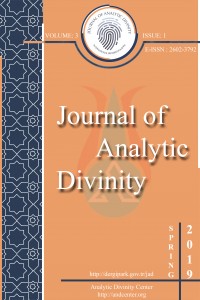Abstract
Human beings have highly advanced neurophysiological
mechanisms, the power of perception and reasoning, and superior
adjustment organism. As a culture producer and language user human
beings, live in a natural and social environment that needs to cope with and
have a unique self. Human beings who are the doer and judge of good and
evil have the ability of prediction and potential of self-transcendence.
Despite these superior qualities, human beings have not always shown the
same superiority in their lives and due to both they are in need of belief and
their potential of faith, they have been a faithful being.
Faith, which has a great effect on the individual's psychological and
social life, is not composed of only one factor. The deep impact of faith on
believer, the influence on personality, the production of strong emotions
and behaviors are directly related to the psychological factors of faith. These
psychological elements in the structure of faith, are cognitive, voluntary,
emotional and behavioral factors. Faith, which constitutes a holistic
structure with these factors, cannot be thought apart from these
psychological factors that make it up, nor can it be reduced to any of these
elements. Therefore, in order to fully understand and explain the faith,
which is a psychological process in which the individual's cognition, will,
emotion and behavior systems are personally involved, it is necessary to
first understand the psychological elements in the structure of faith. In this
article, taken from the master thesis titled "Religious Belief and Meaning ”,
psychological factors of faith will be discussed.
Keywords
References
- ALPER, H. (2002). İmanın Psikolojik Yapısı İstanbul. Rağbet Yayınları.
- CEVİZCİ, A. (1999). Paradigma Felsefe Sözlüğü. İstanbul: Paradigma Yayınları.
- ENGLISH OXFORD LIVING DICTIONARIES: https://en.oxforddictionaries.com/definition/cognition. (Erişim Tarihi: 22. 05. 2019).
- FRAASSEN, C. V. (1984). “Belief and The Will”. The Journal of Philosophy 81/5.
- GÜLER, İ. (1998). “İman ve İnkarın Ahlaki ve Bilişsel (Kognitif) Temelleri”. İslamiyat Dergisi 1.
- JAMES, W. (1919). The Will to Believe and Other Essays in Popular Philosophy. Norwood: The Plimpton Press.—. (2002). The Varieties of Religious Experience. Pennsylvania: Pennsylvania State University.
- KARACA, F. (2017). Din Psikolojisi. Trabzon: Eser Yayınevi.KRECH, D vd. (1970). Cemiyet İçinde Fert. Çev. Mümtaz Turhan. İstanbul: Sosyal İlimler Komisyonu Yayınları.
- MEHMEDOĞLU, A. U. (2013). İnanç Psikolojisine Giriş. İstanbul: Çamlıca Yayınları.
- TANGNEY, J. P vd. (2004). “High Self-control Predicts Good Adjustment Less Pathology Better Grades and Interpersonal Success”, Journal of Personality, 72/2
- TOKUR, B. (2018). İmtihan Psikolojisi. Ankara: Fecr Yayınları.
Abstract
İnsan, son derece gelişmiş nörofizyolojik mekanizmalara sahip olan; algılama ve düşünme gücüne sahip, üstün bir uyum organizması olan; kültür üreticisi ve dil kullanıcısı, başa çıkması gereken doğal ve sosyal bir ortamda yaşayan bir varlık olan; benzersiz bir benliği, iyi ve kötünün faili ve yargılayıcısı olan; öngörüde bulunabilen, zaman içinde yaşayan ve öz-aşkınlık potansiyeli olan bir canlıdır. Sahip olduğu bu üstün özelliklere karşın insanoğlu, hayat karşısında her zaman aynı üstünlüğü gösterememiş olup hem ihtiyaç duyması sebebiyle hem de bünyesinde bulunan potansiyeli gereği inanç sahibi; iman eden bir varlıktır.
Bireyin psikolojik yapısında, bireysel ve sosyal yaşantısında büyük bir etkisi bulunan iman ise, tek bir unsurdan müteşekkil değildir. İnanan kimseye derinden nüfuz etmesi, kişiliğe etkide bulunabilmesi, güçlü duygu ve davranışlar üretmesi imanın psikolojik unsurlarıyla doğrudan ilgilidir. İmanın yapısında bulunan bu psikolojik unsurlar, bilişsel; iradi, duygusal ve davranışsal olmak üzere dörde ayrılır. Bu unsurlar ile bütünsel bir yapı meydana getiren iman, kendisini meydana getiren bu psikolojik faktörlerden ayrı düşünülemeyeceği gibi, bu unsurlardan herhangi birisine de indirgenemez. Dolayısıyla, bireyin biliş, irade, duygu ve davranış sistemlerinin bizzat katıldığı psikolojik bir süreç olan imanın tam manasıyla anlaşılması ve açıklanabilmesi için öncelikle imanın yapısında bulunan söz konusu psikolojik unsurların anlaşılması gerekmektedir. “Dini İnanç ve Anlam” isimli yüksek lisans tezinden alınan bu makalede imanın psikolojik unsurları ele alınacaktır.
Keywords
References
- ALPER, H. (2002). İmanın Psikolojik Yapısı İstanbul. Rağbet Yayınları.
- CEVİZCİ, A. (1999). Paradigma Felsefe Sözlüğü. İstanbul: Paradigma Yayınları.
- ENGLISH OXFORD LIVING DICTIONARIES: https://en.oxforddictionaries.com/definition/cognition. (Erişim Tarihi: 22. 05. 2019).
- FRAASSEN, C. V. (1984). “Belief and The Will”. The Journal of Philosophy 81/5.
- GÜLER, İ. (1998). “İman ve İnkarın Ahlaki ve Bilişsel (Kognitif) Temelleri”. İslamiyat Dergisi 1.
- JAMES, W. (1919). The Will to Believe and Other Essays in Popular Philosophy. Norwood: The Plimpton Press.—. (2002). The Varieties of Religious Experience. Pennsylvania: Pennsylvania State University.
- KARACA, F. (2017). Din Psikolojisi. Trabzon: Eser Yayınevi.KRECH, D vd. (1970). Cemiyet İçinde Fert. Çev. Mümtaz Turhan. İstanbul: Sosyal İlimler Komisyonu Yayınları.
- MEHMEDOĞLU, A. U. (2013). İnanç Psikolojisine Giriş. İstanbul: Çamlıca Yayınları.
- TANGNEY, J. P vd. (2004). “High Self-control Predicts Good Adjustment Less Pathology Better Grades and Interpersonal Success”, Journal of Personality, 72/2
- TOKUR, B. (2018). İmtihan Psikolojisi. Ankara: Fecr Yayınları.
Details
| Primary Language | Turkish |
|---|---|
| Subjects | Religious Studies |
| Journal Section | Peer-reviewed Research Articles |
| Authors | |
| Publication Date | June 15, 2019 |
| Published in Issue | Year 2019 Volume: 3 Issue: 1 |
· JAD accepts the Open Access Journal Policy for expanding and flourishing of knowledge.
· Adress: Ankara Yıldırım Beyazıt Üniversity, Faculty of Islamic Sciences, Esenboga Campus, Cubuk/Ankara


